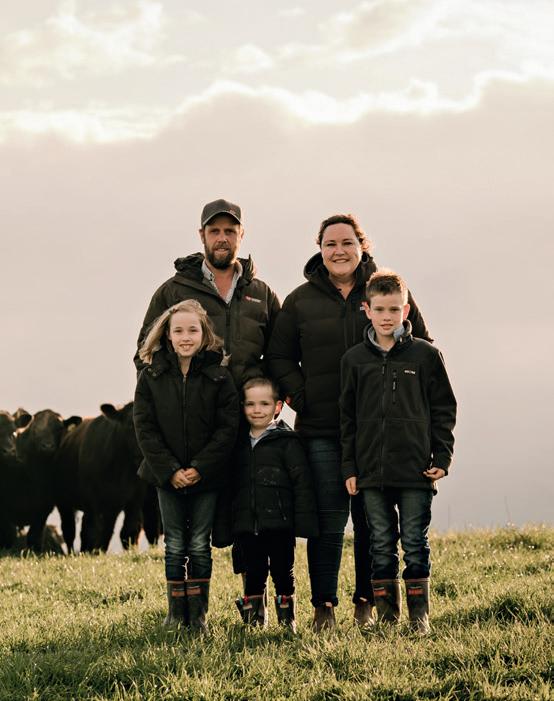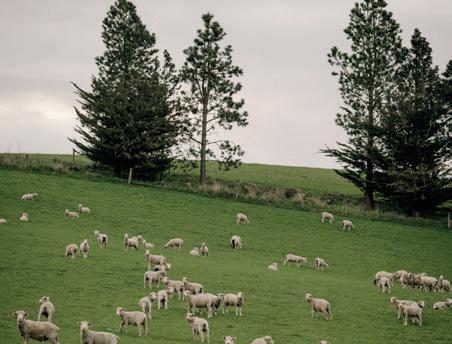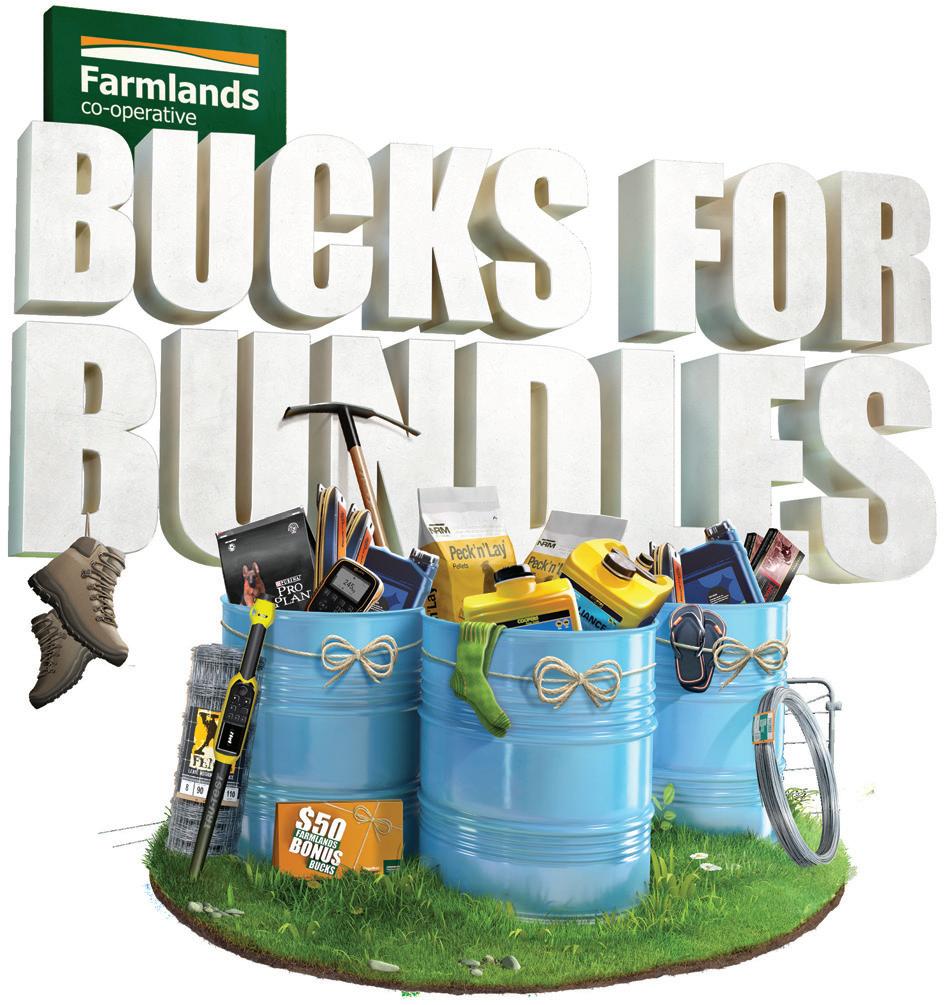
6 minute read
Crew helps Monowai chart stormy waters
A rough start to running their own farm quickly taught Angus and Liv France the benefits of a solid network of supporters, including Farmlands.
As the third generation on their family farm, Angus and Liv France know that networking and collaboration are key to the stability and success of their business.
Angus and wife Liv took over the familyowned Monowai Station, near Albury, South Canterbury, 5½ years ago. While the sailing wasn’t smooth at first, the couple have persevered and worked collaboratively to come up with their own programme for the property. The trading operation now uses the feed it grows in the summer to fatten stock over the winter in what is turning out to be a winning self-sufficient formula. Looking back on a rough start, Angus says he and Liv had to quickly build a support network. “Luckily we found good people and they are still the ones who are looking after us today, as we are looking after them. “Our stock agents get the stock when we need it and then sell it at the right time at the other end. From our accountant and lawyer through to vet advice and our local Farmlands Fairlie store it is a massive interlocking network that supports our business. “It’s great to have a collective team around us who we can quiz, get advice from and just chat around farming practices and batting ideas around.” The France family’s farming ownership began in 1948 when Angus’s grandfather, Jim France, returned from war and drew a ballot block. He had a few areas to choose from and selected the property, naming it Monowai after the first Navy vessel he served on. The next generation came through with Angus’s father John and wife Jenny



| Angus and Liv hope their children, Pippa, 7, Digby, 5, and Jack, 8, will become the fourth generation at Monowai.
taking over, although still assisted by Jim, who carried on farming into his 90s. Angus and his two brothers and sister had been encouraged to gain off-farm qualifications, particularly during a time when farming was challenging. But for Angus the bug kept biting. He completed a farm management diploma at Lincoln University and went shepherding on South Island properties. Angus then headed overseas and the farm was leased out to a dairy farmer. After 4 years Angus returned and he and his parents began talking succession. In March 2016 the timing was right for purchase and Angus and Liv bought the 1,000ha property. Angus said he had always wanted to end up at home on the farm and enjoys the support his dad still offers. “When we were growing up Dad had always farmed sheep and beef but because the property had been leased out to dairy prior to us purchasing it, we did our initial budgets on dairy grazing. Unfortunately, the 2016 dairy market crash turned our budget upside-down and with limited dairy demand and reduced options we needed to make some quick decisions about how we moved forward.” The Frances ended up buying in half breed lambs and Angus steer calves to complement the cows they already had and began a relationship with the Five Star Beef feedlot in Ashburton. “For us it was about going back to what works. We mainly run the farm as a trading operation and while we have tried a lot of other stock to see if they fit, like dairy cow grazing and different age groups of Friesian bulls, we found they didn’t really work. So now we stick with half breed lambs and Angus steers, which is what suits our unique farming operation.” The right mix is also about factoring in the farm make-up and environment. Monowai Station has 500ha of flat
Angus France
non-irrigated land and 500ha of tussock steeper hill face. It receives an average annual rainfall of about 800mm. “It can certainly get pretty dry and with no irrigation we are very much reliant on rainfall and timing.” The property now runs 230 Angus breeding cows, with all progeny finished on the property. They buy in 400 Angus steer calves at around 250kg in April and take them through until late November. The calves are sold in batches over the summer at around 480-500kg, usually going to the Five Star Beef feedlot to be grown on. Around 150 R2 Angus steers are bought around February and wintered for the August market and around 150 of the steers they breed are taken through for a second winter. Angus is a major fodder beet fan and grows 53-54ha of Brigadier fodder beet on-farm every year, which is fed to the steer calves and R2 stock. Angus describes their model as working backwards. “We have the most stock on in the winter and it can get cold, but we have the feed from what we have made in the summer. We have silage pits, fodder beet and bales and that enables us to grow our stock through the winter to meet the market in the spring when it’s at its premium. “Basically, we capitalise on what we’ve got and what we can grow to get the most out of the market.” Angus buys in 5,000 half breed lambs early in the new year and takes them through the winter, selling them in the spring. Around 3,000 lambs are pad fed with barley and lucerne baleage with the rest grazed on the hill faces. A total of 30ha of lucerne is planted on-farm and fed to the lambs over the winter. Angus says the drought tolerance of the high feed-value crop is key to the lambs’ fast growth rates. “When the lambs arrive, we shear them, they have lucerne bales throughout the winter, we shear them again around the end of August. Then they go onto spring grass and hopefully head off the farm at 45kg plus. Holding them for nine months so they are still classed as a lamb and growing them to a 20kg carcass weight is the goal. “We try and have all the lambs finished by the end of November as we are very aware of the extra pressures a dry summer can have.” Angus acknowledges that while his farming programme is intensive, he also feeds the land with fertilisers and lime on the hill faces, to keep the property and its production at the highest level possible. “To make the farm pay we have to have it humming to meet the requirements. It was certainly a hard few years when we first started out and we were finding our feet, but once we got our systems in place and knew what worked, and what didn’t, life got easier. “Dad has been a great support and role model. He let me try things, he’d say, “I’ve done that, and it didn’t work.” Then I would do it anyway and he was right, it didn’t work, but he let me learn from my own experiences.” Angus and Liv hope their children, Jack 8, Pippa 7, and Digby, 5, will become the fourth generation at Monowai. “We hope they are succession in the making. They love being involved in the farm at the moment and we will be pushing for that to continue. “Farming can offer a lot of freedom and also a lot of stress. With the support of people around us we have developed a good unit and we look forward to taking that into the future.”
Angus France










